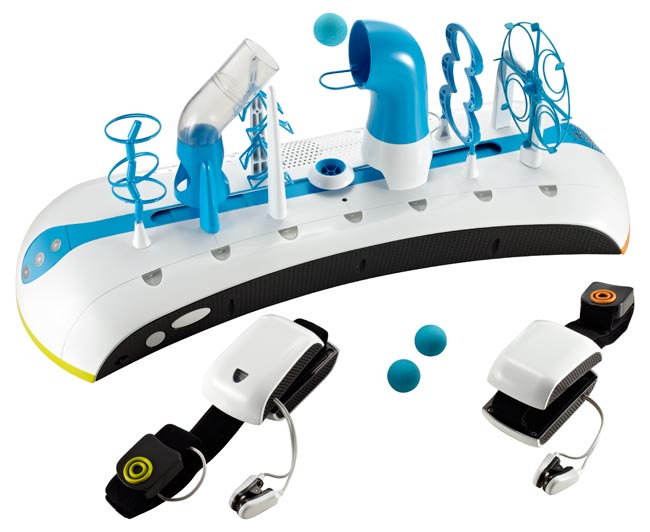Just How Smart are You?
Mensa is a well-known organization for highly intelligent people. To get in you need to score in the top 2% of a standardized intelligence test. There are about 57,000 members in the US. I hope they are reading the Next Brain Blog!
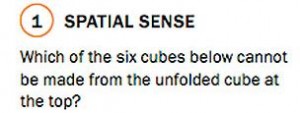 Each year the organization runs a national games competition called Mind Games. It is clear they are big on games as a way to test and boost intelligence. Check out their all ages Game Room. If you want to see how you would stack up, try out this 9-question sample (including answers), offered by Scientific American.
Each year the organization runs a national games competition called Mind Games. It is clear they are big on games as a way to test and boost intelligence. Check out their all ages Game Room. If you want to see how you would stack up, try out this 9-question sample (including answers), offered by Scientific American.
I am interested to hear from readers that are Mensa members. What tips can you share for improving brain function and cognitive performance?
Categories: Cognitive Development Tags: games
$25,000 Brain Health Contest Ends May 5, 2013
 The AARP is sponsoring a sweepstakes designed to promote brain health. If you are 45 years or older you can sign up for free, learn about brain health and play various brain training games to compete. Games include memory match, private eye, split word, countdown and a brain teaser. You earn an entry for each level you complete and restrictions apply. You can also read library articles to earn entries if the games don’t appeal to you.
The AARP is sponsoring a sweepstakes designed to promote brain health. If you are 45 years or older you can sign up for free, learn about brain health and play various brain training games to compete. Games include memory match, private eye, split word, countdown and a brain teaser. You earn an entry for each level you complete and restrictions apply. You can also read library articles to earn entries if the games don’t appeal to you.
I hope they publish some data on the results once the contest is over. It will be interesting to see if this approach has a material impact on brain health.
I am interested to hear from readers that know about other brain health contests or sweepstakes.
Categories: Older Adult, Software, Training Tags: games
20 Hours of Mobile Gaming Enhances Cognition
 A new study found that playing video games for an hour a day, five days per week, for a month produced significant improvements in a player’s ability to track multiple objects and complete visual search tasks. That is just 20 hours of using games that are a lot of fun.
A new study found that playing video games for an hour a day, five days per week, for a month produced significant improvements in a player’s ability to track multiple objects and complete visual search tasks. That is just 20 hours of using games that are a lot of fun.
Researchers looked at the effects of action games and non-action games. The games in the study included: Modern Combat Sandstorms. The Sims3, Bejeweled 2, Memory Matrix and Hidden Expedition Everest.
There are two important aspects of this study for readers of the Next Brain Blog:
- Gaming improves specific cognitive skills on small screens and works in the wild. Participants used their iPhones and did the training outside the laboratory in a real world setting.
- Non-action games, for example Sims3 and Memory Matrix showed some evidence of improving cognitive skills. While this is a preliminary result, it is important for those that don’t like violent games.
I am interested to hear how readers are using their mobile phones to play games or use other apps to improve brain function and cognitive performance.
Categories: College Student, Memory and Learning, Perception Tags: games
Will Playing Video Games Boost Kid’s Creativity?
 The answer is yes according to recent research at Michigan State University. They studied 500 12-year-olds and found that playing video games increases creativity when it comes to drawing pictures and writing stories. The finding is robust:
The answer is yes according to recent research at Michigan State University. They studied 500 12-year-olds and found that playing video games increases creativity when it comes to drawing pictures and writing stories. The finding is robust:
“… regardless of gender, race or type of game played by the students, the study found a relation between video game playing and greater creativity.”
They also found no increase in creativity through the use of computers, the Internet or smart phones.
Interested to hear from readers that include video game playing in an effort to develop their children’s brain function and cognitive performance.
Categories: Child, Problem Solving, Software Tags: creativity, games
Playing Scrabble Can Boost Visual Cognition 20%!
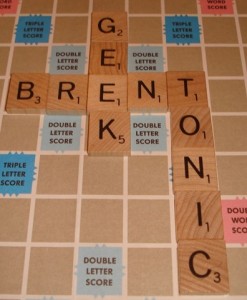 Competitive scrabble players are able to recognize words 20% faster than non scrabble players according to new research from the University of Calgary. More importantly, they found it enhances the cognition you use to recognize words:
Competitive scrabble players are able to recognize words 20% faster than non scrabble players according to new research from the University of Calgary. More importantly, they found it enhances the cognition you use to recognize words:
“The average literate adult relies on three components to process and read a word: sound, spelling and meaning,” says Penny Pexman, professor of Psychology. “When we studied the Scrabble players, we found that there is significant flexibility in the tools they use to read words and that it can include the orientation of the word as well.”
Playing games is one well-known strategy for improving brain function and cognitive performance. Many posts on the Next Brain Blog cover the topic. Trouble is skills developed by game playing are often margin improvements and don’t transfer into new domains. That makes the finding about play Scrabble significant – 20% improvement and it transfers!
I am interested to hear from readers that are getting significant and transferable brain boosts from other games.
Categories: Lifestyle, Memory and Learning, Perception Tags: games
Work With Friends to Build a Stronger Brain and a Better World
 Want to grow your Next Brain? Try GardenMind an intriguing new approach that combines cognitive training, social gaming with optional donations to the World Wildlife Fund (WWF).
Want to grow your Next Brain? Try GardenMind an intriguing new approach that combines cognitive training, social gaming with optional donations to the World Wildlife Fund (WWF).
Your mind is a garden and this metaphor is used to guide how you experience brain training. For example, you play memory games to grow deciduous trees and play language games to grow flowers. You can visit a friend’s garden to provide assistance or offer a friendly challenge. Best of all, contributing to WWF initiatives means animals visit and live in your garden.
Very interested to hear from readers that play GardenMind or are aware of similar brain training platforms.
Categories: Cognitive Development, Software, Training Tags: brain training, games
iPhone App Brain Training Experiment
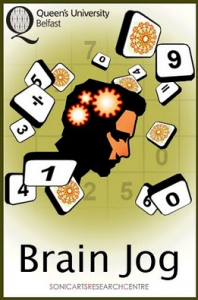 Researcher at Queen’s college worked closely with adults over 50 to develop four puzzles in a brain training app designed to improve brain health.
Researcher at Queen’s college worked closely with adults over 50 to develop four puzzles in a brain training app designed to improve brain health.
“Brain Jog is unique among similar apps in that it has come to fruition after extensive research and collaboration with the target audience to find out exactly what appeals to them. “By downloading this app, you can help us create a fantastic game experience for those over 50 and bring us one step closer to finding out whether or not brain training can help prevent cognitive decline and dementia.”
You can play Brain Jog on the iPhone, iPad or iPod. The four puzzles test and build cognition in spatial reasoning, working memory, arithmetic and verbal ability.
This is a good opportunity to get some free brain training and help shape the next version of the product.
Categories: Cognitive Decline, Software Tags: games, smart phone
Brain Teaser Made of 216 Tiny Magnets
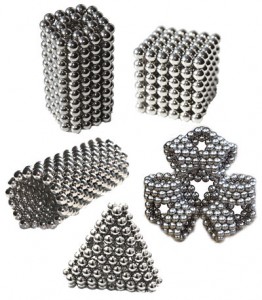 There is some evidence that working puzzles and playing certain types of games helps to maintain brain function and improves specific areas of cognitive performance. There are many posts on the Next Brain Blog about such games.
There is some evidence that working puzzles and playing certain types of games helps to maintain brain function and improves specific areas of cognitive performance. There are many posts on the Next Brain Blog about such games.
One I was recently introduced to is made up of 216 small but very powerful magnets that you can recombine into a wide variety of shapes. It is a simple addictive toy. Although I am not aware of any studies on its effectiveness, the idea is to stimulate your brain by thinking up and making fun and interesting shapes. And it seems popular with those interested in brain training. A version of it called, Buckyballs, is a brainy bestseller at Marbles – the brain store.
Working with your hands to make a shape you dreamed up or just play around is a key feature. You accidentally discover cool shapes and learn a little bit about the laws of physics.
Interested to hear from readers about other direct manipulation toys that seem to have a brain boosting effect.
Categories: Mental Focus, Perception, Problem Solving Tags: games
Brainwave Control Toys Move Forward
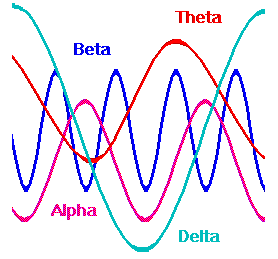 Learning to control your brainwaves through concentration, relaxation, visualization, meditation and other techniques is a cornerstone for peak cognitive performance. Learning to control your brainwave is often difficult because you don’t have direct and immediate feedback on what state you are in. Neurofeedback devices that display information about brain states in real-time solve that problem. The devices work on a brain-to-computer interface and have recently move into the consumer market.
Learning to control your brainwaves through concentration, relaxation, visualization, meditation and other techniques is a cornerstone for peak cognitive performance. Learning to control your brainwave is often difficult because you don’t have direct and immediate feedback on what state you are in. Neurofeedback devices that display information about brain states in real-time solve that problem. The devices work on a brain-to-computer interface and have recently move into the consumer market.
You can get simple models for home use and they have been built into games.
Neurofeedback offers one of the best hopes for a breakthrough in brain training and peak cognitive performance.
So I am always on the look out for new consumer-level neurofeedback devices that might be of interest to readers of the Next Brain Brain blog. Mattel has announced a new version of their Mindflex mental acuity game, call Mindflex Duel: The cost is $99. Here is the short story:
“Using advanced technology, Mindflex Duel headsets sense brain activity and send messages to the game platform. Strap on a headset, connect the sensor clip to your earlobe, and align the strap’s metal sensor so it’s flush against your forehead. Your brain activity will trigger the game platform’s motors, which will propel the ball. Bulk up your brain, sharpen your focus, and battle your friends with this hands-free challenge!”
Being able to do neurofeedback in a competitive mode could be a big step forward in using the technology for brain training.
Very interested to hear from readers that use home-based neurofeedback to improve brain function and achieve peak cognitive performance.
Categories: Executive Function, Mental Focus, Software Tags: games, neurofeeback
The Science of Building a Better Brain
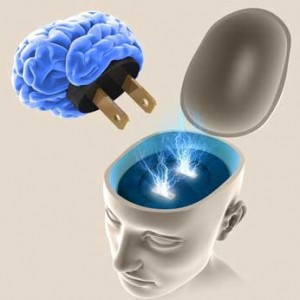 Newsweek did a great job of summarizing the findings from the cognitive enhancement strategies workshop held at the 2010 annual meeting of the Society of Neuroscience. The article, Can You Build a Better Brain? uses the latest neuroscience to differentiate between techniques that work and those that don’t. Techniques for improving brain function and enhancing cognitive performance that have strong scientific support include:
Newsweek did a great job of summarizing the findings from the cognitive enhancement strategies workshop held at the 2010 annual meeting of the Society of Neuroscience. The article, Can You Build a Better Brain? uses the latest neuroscience to differentiate between techniques that work and those that don’t. Techniques for improving brain function and enhancing cognitive performance that have strong scientific support include:
- Drugs that boost dopamine levels such as caffeine
- Regular aerobic exercise
- Meditation training
- Activities that boost mood and confidence
- Action-oriented video games
- Cognitive training software but only for the tasks done using the software
All of these techniques have been covered in the Next Brain Blog. Techniques that don’t appear to have strong evidence include, and I quote:
“Vitamins B6, B12, and E; beta carotene; folic acid; and the trendy antioxidants called flavenoids are all busts, and the evidence for alcohol, omega-3s (the fatty acids in fish), or having a large social network is weak. The Mediterranean diet is associated with a lower risk of cognitive decline, find observational studies, but that hasn’t been confirmed in more rigorous, randomized controlled studies, and no one knows whether the benefit comes from what the diet includes (olive oil, fish, vegetables, wine) or what it excludes (red meat, refined sugars, dairy fat). Statins don’t help, and neither do estrogen or NSAIDs (aspirin, ibuprofen).”
Although some of these have supporting studies they lack a clear causal connection to brain plasticity or other currently understood mechanism of cognition.
Categories: Other Tags: brain training, exercise, games, meditation, mindfulness, Mindset, vitamins

